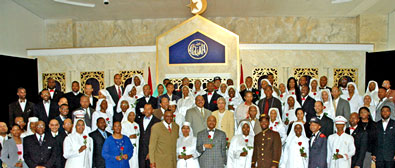CHARLENEM

(FinalCall.com) – Over 100 organizations across the U.S. celebrated Black Marriage Day March 27 with a host of activities, seminars and lectures.
In some communities, this season finds young brides shopping for over-priced wedding gowns and accessories. However, Black Marriage Day organizers state that the scene may be otherwise for Black communities where matrimonies continue to decline.
“We’ve gone from having the highest marriage rates in 1890, right after slavery, when we could barely do more than jump over a broom, to today having the lowest marriage rates,” stated Nisa Islam Muhammad, co-founder of the Wedded Bliss Foundation, a non-profit organization dedicated to strengthening Black marriages and families.

Disturbed by the decline and encouraged by the benefits of marriage, such as increased mortality, safer neighborhoods and more income, Ms. Muhammad helped launch Black Marriage Day in 2003, and believes that Black marriages are crucial to this year’s 10th Anniversary of the Million Man March.
“What the Honorable Minister Louis Farrakhan is trying to accomplish is to unify us in all areas and to improve our lives in every area. You can’t talk about improving Black life without talking about improving Black marriages,” she stated.
Many question why, as a single mother, Ms. Muhammad even cares about the state of marriage, but her cause is simple, yet urgent. “I see the devastation in our community as a result of the lack of strong marriages. I see the veil of destruction that is over the glamorization and elevation of the single Black woman. I see what’s behind the hype, and to me, it’s all a conspiracy. When you elevate one person in a family to the exclusion of the other, you’re going to cause problems in that family,” she stated.
She further noted that, in Milwaukee, Wis., 85 percent of the young men incarcerated hail from single parent households, and that sadly, the numbers are similar across the nation.
“It was not designed to be just a one-person job, but, like it’s stated in the song by Fantasia, ‘Baby Mama,’ we wear this like a badge of honor, but there’s no honor in not being able to get and keep a man. The devil has made evil fair-seeming,” she opined.
To help reverse the pattern, Rev. LeHavre Buck and his Milwaukee-based Institute for African American Family Development sponsored workshops at Hart Love Place, such as “How to Keep Your Temple Healthy For the Ones You Love,” “Extreme Make Over Relationships” and “Christian PREP,” a Prevention Relationship Enhancement Program.
On the West Coast, informed La Grande Mason, director of Helping Angelinos Live Optimistic, Inc. (H.A.L.O.), city officials proclaimed March 27 Black Marriage Day in L.A. County.
Mr. Mason said one challenge to creating healthy marriages is the lack of preparation, study and resources on the matter by religious leaders. “They’ve been given the call for a spiritual message overall, but not one that would allow them to educate and serve couples when they come into problems. They will challenge that couple as far as their faith is concerned, but they don’t know how to give them skills like communication, respect and rekindling their intimacy, to bring their relationship together.”
H.A.L.O.’s celebration at Benny H. Potter Park included a couples’ tribute. Next year, it plans to honor couples who have overcome long-term separation and conquered drug and alcohol abuse. It will also highlight military couples, Mr. Mason stated.
“As enlisted and deployed individuals, some do not come back to an awaiting spouse. Rather, they find a “Dear John” letter. Because of the post-stress caused by military duty, others have a hard time coming back to a non-military life with a family and loved one.”
Leslie Muhammad, who will mark 10 years of marriage on Apr. 10 to her husband, Dorsey, coordinated Baltimore’s activities, which included Sister Nisa’s lectures at Muhammad’s Mosque No. 6, a couples and singles candlelight dinner dance, games, poetry, and resources on marriage, commitment, blended families, overcoming infidelity and resisting divorce. She asserts that the day is not suggesting people remain in abusive relationships.
“It’s about helping our community understand that, over time, we’ve lost our marriages and our communities don’t reap the benefits. We need to know that we can reach out as a community and get help for our marriages. We get help for other things that break down, but we don’t go and get help for our marriages,” she stated.
Atlanta, Fort Lauderdale, Oakland and Louisiana were among the many other cities that celebrated the occasion.
(For more information on healthy Black marriages, or to organize an event in your community, visit BlackMarriageDay.com.)












